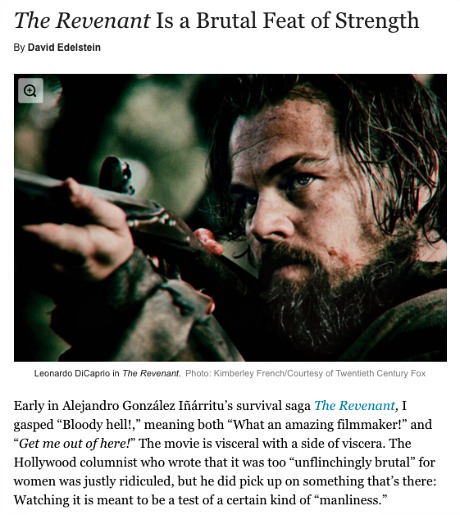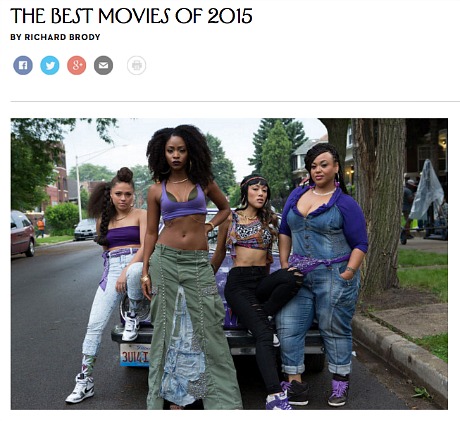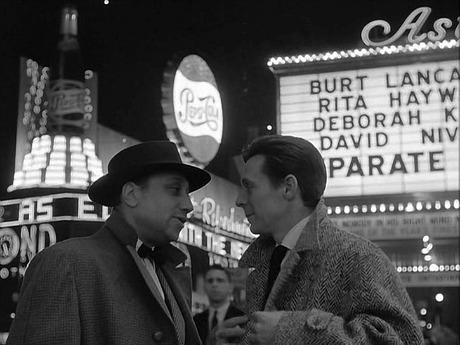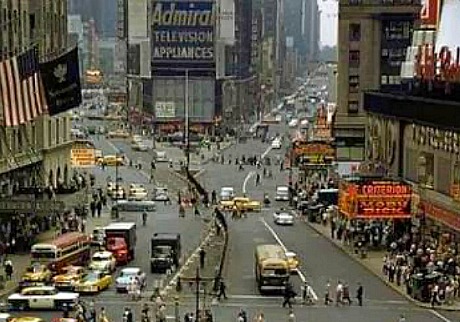I find this 1963 footage of JFK rehearsing remarks about the preservation of the oceans fascinating. The healthy complexion with the light brown hair. The nice cut of the bluish-gray suit. The contained, guarded vibe. A brief look of gruff vanity as he yanks his jacket sleeves toward his shirt cuffs. The first attempt followed by “All right, let’s start again” and then a realization that using “source” and “resource” in the same sentence wouldn’t work.
 Jeffrey Wells
Jeffrey Wells
Biggest, Most Secretive, Most Goon-Heavy Hollywood Premiere in Cinema History?
Monday evening’s 6:30 pm premiere of Star Wars: The Force Awakens, which has already involved shutting down Hollywood Blvd, from La Brea to Highland Avenue and the construction of a huge, block-long tent for a post-premiere reception, will allegedly take place at the Chinese, the Dolby (home of the Oscar telecast) and the El Capitan simultaneously. The detailed invite with a parking pass arrived in my inbox late yesterday, but it didn’t say which theatre I’ll be seeing the film in. For whatever reason Disney publicists have decided there’s a strategic advantage to keeping that information under wraps until guests begin arriving at 5 pm. I’ve decided to park three or four blocks away (the Highland garage will be a complete zoo) and hump it over. I’m also going to get there at 4:30 pm.

Don’t Make A Big Thing Of It
For me Christmas means taking time to visit family and friends and…you know, strolling around Manhattan and Crown Heights in nippy weather and the fun of wearing scarves and gloves and overcoats and sipping hot chocolate in cafes while snow flurries fall. It means not buying a tree or decorating it or any of that jazz, but definitely watching my Bluray of the 1951 Alistair Sim version of A Christmas Carol and attending a New York Oratorio performance of Handel’s “Messiah” at Carnegie Hall. And roaming around lower Broadway (West 4th to Canal) and poking around stores and whatnot. And that’s about it. A nice two-week detour (starting with my flight to NYC on 12.17) before it all starts again with the Golden Globes on 1.10.16, and followed by the 2016 Sundance Film Festival (1.21 through 1.31).
Movies Need To Turn It Down and Be “Boring” For A While
I found this portion of John Frankenheimer‘s commentary track for a DVD of Seven Days in May on my iPhone this morning. I know this 1964 thriller fairly well, and can confirm without hesitation that this apartment scene between Kirk Douglas and Ava Gardner is the flattest and least interesting in the whole film. Frankenheimer is nonetheless saying that movies can’t be entirely composed of jolt-cola, narrative-propulsion moments. They need to be quiet and meditative and meander from time to time, and even allow for a little “boredom.” The late director is saying that the research-screening process had, in his experience, led to such moments being cut out in order to keep the story tension at high levels.
If You Put It That Way
“Let’s say you have a jar with 10,000 M&Ms, and only 10 of them are poisoned. Would you eat them?” — An analogy offered by Arleigh Clemens, a 78 year-old Iowa Republican, that N.Y. Times reporter Jason Horowitz included in a 12.11 piece (“Attack Spurs New Chapter in History of Dread in the U.S.”). Like most reasonable people I think Donald Trump‘s ban-all-Muslims notion is racist and xenophobic and plays right into the ISIS scheme. Then again Clemens is addressing what many people are thinking deep down. He’s saying that while the vast, vast majority of U.S.-residing Muslims may be totally cool, there are always a couple of bad apples in every barrel and that’s all it takes — a few wacko nutters to spray hot lead in a crowded place. This is why Donald Trump’s popularity has been spiking.
Kubrick Comes Clean
An above-average Stanley Kubrick moon-landing-hoax video, allegedly recorded three days before Kubrick’s death, popped a couple of days ago. It’s a reasonably decent bit, of course, but apparently some people are believing it’s real in the same way people believed in Orson Welles‘ Martian invasion broadcast of 1938. The actors who plays Kubrick does a fairly good job. He doesn’t quite capture Kubrick’s Bronx accent, but at least he doesn’t overdo it.

When You Dance I Can Really Love
I re-watched Ex Machina a few days ago. Not at home but at a cool-kidz screening at West Hollywood’s London. (Just before that I sat down with director-writer Alex Garland, although I’m sorry to report I accidentally erased the recording.) This, in any event, is one of my favorite scenes in the film. It’s not a necessary scene (Ex Machina would be fine without it) but a nice supplemental one. At the very least it gives you a moment of pause when Oscar Isaac‘s Nathan Bateman gets “his” at the end. A genius who can dance doesn’t deserve [redacted due to the wrath of Glenn Kenny and a couple of others.]
Last Pointless Clarification
In a 12.11 Revenant review, New York‘s David Edelstein has written that I was “justly ridiculed” for writing that Alejandro G. Inarritu‘s film was too “unflinchingly brutal” for women. I didn’t actually write that. Having witnessed a female dp friend go into a fetal-tuck position in her seat and hearing from a journalist friend that his wife “wouldn’t last five minutes with this thing,” I half-assedly tweeted “forget women seeing this.” Three hours later I allowed that if “I had given the matter 15 or 20 seconds worth of thought I would have rephrased and qualified in some way. I’m not stupid, and I know that generalizations always get you into trouble.” What I wrote, in fact, was that The Revenant is “an unflinchingly brutal, you-are-there, cold-wind, raw-element immersion like something you’ve never seen…rapturous, fierce, delirious…submerged in ice, arctic air, brutality…an ordeal of blood, agony, survival, snow, ice water, wounds and steaming horse guts.”

Intentionally Perverse
Richard Brody’s roster of the 30 Best Films of 2015 is, of course, a partial joke. How else to describe a list that completely ignores The Revenant and Love & Mercy but includes Woody Allen‘s Irrational Man (a so-so film that was certainly thrown off balance if not poisoned by the sight of Joaquin Pheonix‘s enormous pot belly), Andrew Bujalski‘s mildly engaging-but-nothing-to-write-home-about Results and Angelina Jolie‘s By The Sea (which isn’t half bad in a certain light but which hardly belongs on anyone’s best-of-the-year list…c’mon), and which gives a last-place slot to the terminally awful Fifty Shades of Grey. I could assemble a list like this if I wanted to, just to fuck with people’s heads. Then again what can you expect from a guy who seems to genuinely believe that Alfred Hitchcock‘s Marnie is an under-appreciated masterpiece?

As I haven’t seen (and am in no hurry to see) Spike Lee’s Chi-Raq, I have no comment about New Yorker columnist Richard Brody calling it his #1 film of 2015.




